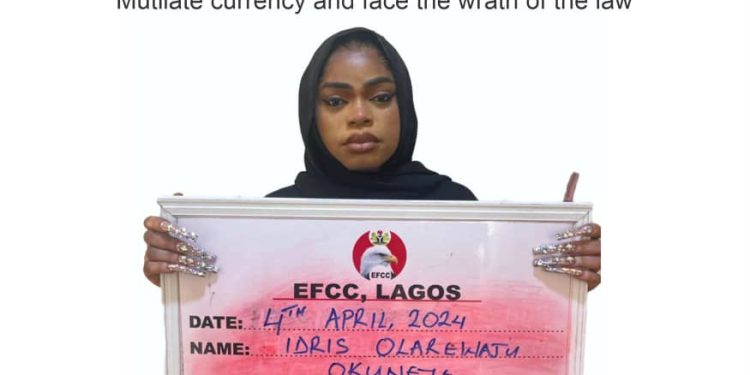In a recent development, controversial Nigerian socialite Idris Okuneye, popularly known as Bobrisky, finds himself under the scrutiny of the Economic and Financial Crimes Commission (EFCC) for allegedly engaging in the unlawful act of spraying Naira notes. This incident has sparked considerable attention, shedding light on the legal implications of such actions and raising questions about the accountability of public figures.
Operatives of the EFCC’s Lagos Zonal Command launched an investigation into Bobrisky’s activities following a video report that captured him spraying and flaunting wads of new Naira notes at the premiere of the movie “Ajakaju,” produced by Nollywood actress and producer Eniola Ajao. The event took place at the prestigious Film One Circle Mall in Lekki, Lagos, on March 24, 2024. Subsequent inquiries revealed that this wasn’t an isolated incident, as Bobrisky had allegedly engaged in similar behavior at other event centers and parties on multiple occasions.
In response to the EFCC’s invitation, Bobrisky appeared at the Lagos Zonal Command headquarters on Wednesday, April 4, 2024, for interrogation. He voluntarily provided statements to aid in the investigation, demonstrating a willingness to cooperate with the authorities. However, the outcome of the investigation remains pending as the EFCC continues its probe into the matter.
The act of spraying Naira notes, also known as “money spraying,” is a violation of the Central Bank of Nigeria’s regulations. It is considered a form of public nuisance and a disregard for the country’s currency. If found guilty, Bobrisky could face legal consequences, including potential charges and penalties.
News of Bobrisky’s interrogation by the EFCC has generated significant public interest and sparked discussions on social media platforms. While some express concern over the alleged misconduct and call for accountability, others defend Bobrisky, citing freedom of expression and questioning the severity of the accusations.
As the investigation into Bobrisky’s alleged involvement in Naira abuse unfolds, it serves as a reminder of the importance of upholding financial regulations and respecting the law. Regardless of one’s status or influence, all individuals are subject to legal scrutiny and must be held accountable for their actions. The outcome of this case will undoubtedly have implications for the future conduct of public figures and the enforcement of financial regulations in Nigeria.










